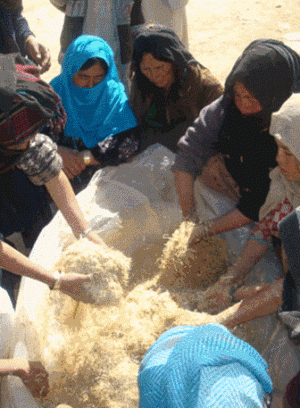
Women mix straw with urea and water to increase the straw’s nutritional value and create feed reserves that will sustain livestock through the winter.
USAID/ASAP
28 MARCH 2011 | KABUL PROVINCE, AFGHANISTAN
Most Afghan farmers feed untreated straw to their livestock. Because they cannot extract enough energy from the straw, this causes the animals to lose weight. With Afghan women feeding their household every day, Dr. Zubeida Popal has an eager audience when she provides training to boost the nutritional value of fodder and increase livestock productivity during the winter months.
“Given that women are responsible for daily household food and childcare, they are very enthusiastic to learn and work on winterfeed reserves,” said Dr. Popal, an extension officer who works with USAID-supported Veterinary Field Units. “They want to ensure the cows and goats produce more milk for the children.”
The field units are a network of private businesses that provide quality input and services to local herders. In preparation for winter, Dr. Popal worked with 177 female farmers and herders in Kabul and Bamyan provinces in central Afghanistan to demonstrate the treatment of straw with urea.
Urea treatment improves the nutritional value of dry feed by increasing crude protein content and making the feed easier to digest for animals.
Local farmers and government officials are grateful to Dr. Popal and her colleagues because they are improving livelihoods for rural men and women. “This is the first time in our province that a woman is facilitating women’s groups to demonstrate urea treatment,” said Dr. Aydar, Director of Livestock and Animal Health in Bamyan Province. “I appreciate the program encouraging women’s participation.
USAID’s Accelerating Sustainable Agriculture Program established a network of Veterinary Field Units – private businesses that provide affordable, accessible veterinary care and treatment services to rural communities.







Comment
Make a general inquiry or suggest an improvement.